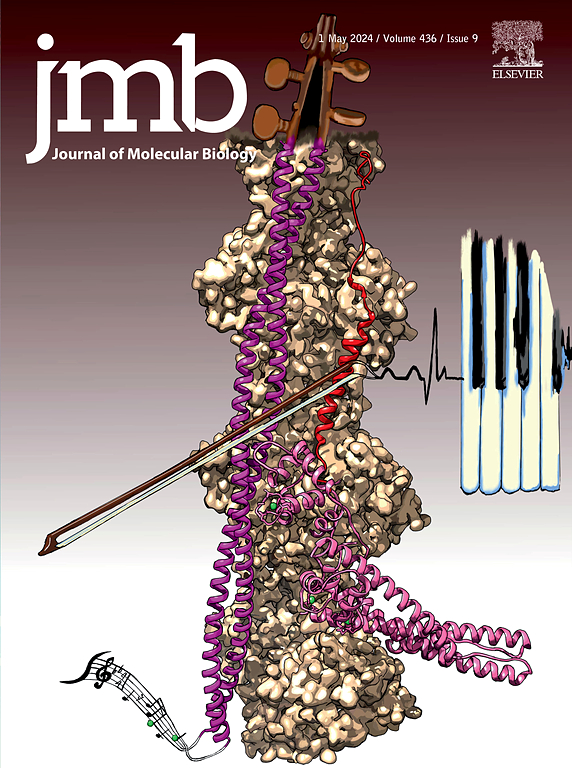tRNA编辑复合体ADAT2/3促进癌细胞生长和密码子偏向的mRNA翻译。
IF 4.5
2区 生物学
Q1 BIOCHEMISTRY & MOLECULAR BIOLOGY
引用次数: 0
摘要
转移rna (trna)受到各种化学修饰影响其稳定性或功能。tRNA反密码子A34位置的腺苷到肌苷(A-to-I)编辑是扩展摆动位置反密码子-密码子识别的重要修饰,是正常mRNA翻译所必需的。tRNA编辑在癌症中的相关性仍未被探索。在这里,我们展示了编码ADAT2/3脱氨酶复合物的基因,在人类中负责A-to-I tRNA编辑,在包括脂质肉瘤(LPS)在内的几种肿瘤类型中通常被扩增和/或过表达。我们发现LPS细胞的生长和致瘤性依赖于ADAT2/3 tRNA编辑活性。在机制上,我们发现在ADAT2耗尽时tRNA编辑减少,mrna子集的翻译缺陷和蛋白质稳态改变。因此,ADAT2促进肿瘤发生和促生长mRNA的翻译,这些mRNA富含缺乏同源tRNA的NNC密码子,因此依赖于A-I tRNA编辑进行解码和mRNA翻译。我们的研究结果确定ADAT2/3是一个潜在的新的癌症治疗靶点。本文章由计算机程序翻译,如有差异,请以英文原文为准。

The tRNA Editing Complex ADAT2/3 Promotes Cancer Cell Growth and Codon-biased mRNA Translation
Transfer RNAs (tRNAs) are subject to various chemical modifications that influence their stability or function. Adenosine to Inosine (A-to-I) editing in the tRNA anticodon at position A34 is an important modification that expands anticodon-codon recognition at the wobble position and is required for normal mRNA translation. The relevance of tRNA editing in cancer remains unexplored. Here we show that the genes encoding the ADAT2/3 deaminase complex, responsible for A-to-I tRNA editing in humans, are commonly amplified and/or overexpressed in several tumor types including liposarcoma (LPS). We find that LPS cell growth and tumorigenicity is dependent on ADAT2/3 tRNA editing activity. Mechanistically, we find decreased tRNA editing upon ADAT2 depletion, defective translation of a subset of mRNAs, and altered protein homeostasis. Thus, ADAT2 promotes oncogenesis and the translation of growth promoting mRNAs that are enriched in NNC codons that lack cognate tRNAs and therefore depend on A-I tRNA editing for decoding and mRNA translation. Our results identify ADAT2/3 as a potential new cancer therapeutic target.
求助全文
通过发布文献求助,成功后即可免费获取论文全文。
去求助
来源期刊

Journal of Molecular Biology
生物-生化与分子生物学
CiteScore
11.30
自引率
1.80%
发文量
412
审稿时长
28 days
期刊介绍:
Journal of Molecular Biology (JMB) provides high quality, comprehensive and broad coverage in all areas of molecular biology. The journal publishes original scientific research papers that provide mechanistic and functional insights and report a significant advance to the field. The journal encourages the submission of multidisciplinary studies that use complementary experimental and computational approaches to address challenging biological questions.
Research areas include but are not limited to: Biomolecular interactions, signaling networks, systems biology; Cell cycle, cell growth, cell differentiation; Cell death, autophagy; Cell signaling and regulation; Chemical biology; Computational biology, in combination with experimental studies; DNA replication, repair, and recombination; Development, regenerative biology, mechanistic and functional studies of stem cells; Epigenetics, chromatin structure and function; Gene expression; Membrane processes, cell surface proteins and cell-cell interactions; Methodological advances, both experimental and theoretical, including databases; Microbiology, virology, and interactions with the host or environment; Microbiota mechanistic and functional studies; Nuclear organization; Post-translational modifications, proteomics; Processing and function of biologically important macromolecules and complexes; Molecular basis of disease; RNA processing, structure and functions of non-coding RNAs, transcription; Sorting, spatiotemporal organization, trafficking; Structural biology; Synthetic biology; Translation, protein folding, chaperones, protein degradation and quality control.
 求助内容:
求助内容: 应助结果提醒方式:
应助结果提醒方式:


